Michael Swanwick's Blog, page 197
March 27, 2012
Kyle Cassidy on War Paint
.
Stories in Ink: Capturing the Art of Tattoos (Highlights) from Franklin & Marshall College on Vimeo.
I'm spending today packing and taking care of various promises made -- for an introduction, a paragraph, a list, an interview, and so on -- in preparation for Friday's jaunt to China. So I wasn't going to blog today. But then I came upon the above clip of Kyle Cassidy talking about photographing tattooed veterans for his book War Paint . Which was so simple and clear that I felt I should share it.
There is something particularly profound about the images with which warriors decorate that skin that might be pierced by bullets, shrapnel, flechettes.
War Paint is being published by Schiffer Books. You can find Kyle's generous collection of images and information here.
*
Stories in Ink: Capturing the Art of Tattoos (Highlights) from Franklin & Marshall College on Vimeo.
I'm spending today packing and taking care of various promises made -- for an introduction, a paragraph, a list, an interview, and so on -- in preparation for Friday's jaunt to China. So I wasn't going to blog today. But then I came upon the above clip of Kyle Cassidy talking about photographing tattooed veterans for his book War Paint . Which was so simple and clear that I felt I should share it.
There is something particularly profound about the images with which warriors decorate that skin that might be pierced by bullets, shrapnel, flechettes.
War Paint is being published by Schiffer Books. You can find Kyle's generous collection of images and information here.
*
Published on March 27, 2012 07:36
March 26, 2012
Beijing Xi'an Guilin Shanghai.
.

When I began this blog, I promised only that, to the best of my abilities, I would post every Monday and Friday. In the thousand-plus posts since, I have failed of that promise only (I think) twice. Most weeks, I've posted five times. Only rarely have I not posted on Wednesday.
That admirable record may well be about to fall. But for good reasons.
On Friday, I fly to China. I won't be seeing any of my friends there, which I greatly regret. Nor will I be taking advantage of various professional contacts to see things not normally available to tourists. I will (and I fear I will lose your respect for admitting this but I have good reasons) be taking a tour.
Why? Because I'm researching a novel to be set in China. For which I need to see exactly the sights which China's tourist board most devoutly wishes I would -- places of great antiquity and extreme beauty which any sensible human being has on his or her bucket list. Two weeks is a pathetically short length of time for such an endeavor. But it's better than nothing. My visit to Chengdu, for which I will always be grateful to the good people at Science Fiction World , transformed my vision of China and only in ways that increased my already high admiration of it. So too, I hope, will this fleeting visit.
While I'm away, I may not be able to post here. The Great Firewall of China is not, alas, a myth. In the airport in Beijing, I learned that it is not possible even to read my blog from China, much less update it. I'll leave instructions with my son Sean and if I have easy Internet access in my tourist hotels, it may be possible for me to forward him entries to be posted here.
But if not, it's not because I've forgotten you.
And while I have your attention . . .
My pal, Eileen Gunn, wants to make sure that I sample the Three Treasures of Guilin while I'm there. They are: Guilin chili sauce, Guilin Sanhu liquor and Guilin pickled tofu. I'll do my damnedest.
If you have any analogous advice, I'd love to hear it. Keep in mind that I'm not likely to be able to wander away from the tour, that I don't speak Chinese (dammit!) and that the only places I'll be visiting, even fleetingly, are Beijing, Xi'an, Guilin, and Shanghai. I'm looking for the thingsthat you'd ask in retrospect: "When you were in . . . did you . . . surely you must have . . . ?"
I have hopes of less superficial visits to China in the future. But for now, your input would be greatly appreciated. If you have opinionated friends, give them this URL.
Thanks!
Above: Karst mountains within Guilin. Yes, these things exist outside of Chinese art. How cool is that? Yeah, you're right: the question answers itself.
*

When I began this blog, I promised only that, to the best of my abilities, I would post every Monday and Friday. In the thousand-plus posts since, I have failed of that promise only (I think) twice. Most weeks, I've posted five times. Only rarely have I not posted on Wednesday.
That admirable record may well be about to fall. But for good reasons.
On Friday, I fly to China. I won't be seeing any of my friends there, which I greatly regret. Nor will I be taking advantage of various professional contacts to see things not normally available to tourists. I will (and I fear I will lose your respect for admitting this but I have good reasons) be taking a tour.
Why? Because I'm researching a novel to be set in China. For which I need to see exactly the sights which China's tourist board most devoutly wishes I would -- places of great antiquity and extreme beauty which any sensible human being has on his or her bucket list. Two weeks is a pathetically short length of time for such an endeavor. But it's better than nothing. My visit to Chengdu, for which I will always be grateful to the good people at Science Fiction World , transformed my vision of China and only in ways that increased my already high admiration of it. So too, I hope, will this fleeting visit.
While I'm away, I may not be able to post here. The Great Firewall of China is not, alas, a myth. In the airport in Beijing, I learned that it is not possible even to read my blog from China, much less update it. I'll leave instructions with my son Sean and if I have easy Internet access in my tourist hotels, it may be possible for me to forward him entries to be posted here.
But if not, it's not because I've forgotten you.
And while I have your attention . . .
My pal, Eileen Gunn, wants to make sure that I sample the Three Treasures of Guilin while I'm there. They are: Guilin chili sauce, Guilin Sanhu liquor and Guilin pickled tofu. I'll do my damnedest.
If you have any analogous advice, I'd love to hear it. Keep in mind that I'm not likely to be able to wander away from the tour, that I don't speak Chinese (dammit!) and that the only places I'll be visiting, even fleetingly, are Beijing, Xi'an, Guilin, and Shanghai. I'm looking for the thingsthat you'd ask in retrospect: "When you were in . . . did you . . . surely you must have . . . ?"
I have hopes of less superficial visits to China in the future. But for now, your input would be greatly appreciated. If you have opinionated friends, give them this URL.
Thanks!
Above: Karst mountains within Guilin. Yes, these things exist outside of Chinese art. How cool is that? Yeah, you're right: the question answers itself.
*
Published on March 26, 2012 00:50
March 23, 2012
Recreating "A Glass of Wine"
.

There can't be many science fiction writers who buy their writing materials at Ikea. But that's what I did today. Specifically, I bought a carafe, because . . .
Well, it takes a bit of explanation. Back on July 2, 1991, I wrote a work of flash fiction called "A Glass of Wine" and scratched it onto a carafe I had lying around. At that time, I forget which cheap wine came in carafes. Whatever it was or is, Pennsylvania's state store system doesn't carry it anymore. Or any other wines in carafes. They've been replaced by boxes, I think.
The story-and-carafe were collectively a performance piece. I went to a convention, bought a bottle of white wine to fill the carafe and requested a flock of clean wine glasses. Then, when a friend came by, I'd say, "Read the story and I'll pour you a glass of wine."
So they'd read, I'd pour, they'd take a sip, and I'd say, "What do you say when somebody gives you something nice?"
And, suddenly realizing that after the story they'd read, there was only one possible answer, they'd smile and say it.
Alas, many long years ago, a decade at least, I dropped and broke the carafe. But I saved the pieces thinking that maybe someday I'd replicate it. It took me forever to get around to that particular chore because it's always easier to create something new than something old. But today I happened to be in Ikea, saw a carafe, and decided it was time.
So I have my project for the weekend.
Those are the two carafes, the old and the new, up above. It's going to be a pain copying the story from the shards to the new carafe because all other copies of the story were lost long ago. But it'll be nice to have the old thing back.
*

There can't be many science fiction writers who buy their writing materials at Ikea. But that's what I did today. Specifically, I bought a carafe, because . . .
Well, it takes a bit of explanation. Back on July 2, 1991, I wrote a work of flash fiction called "A Glass of Wine" and scratched it onto a carafe I had lying around. At that time, I forget which cheap wine came in carafes. Whatever it was or is, Pennsylvania's state store system doesn't carry it anymore. Or any other wines in carafes. They've been replaced by boxes, I think.
The story-and-carafe were collectively a performance piece. I went to a convention, bought a bottle of white wine to fill the carafe and requested a flock of clean wine glasses. Then, when a friend came by, I'd say, "Read the story and I'll pour you a glass of wine."
So they'd read, I'd pour, they'd take a sip, and I'd say, "What do you say when somebody gives you something nice?"
And, suddenly realizing that after the story they'd read, there was only one possible answer, they'd smile and say it.
Alas, many long years ago, a decade at least, I dropped and broke the carafe. But I saved the pieces thinking that maybe someday I'd replicate it. It took me forever to get around to that particular chore because it's always easier to create something new than something old. But today I happened to be in Ikea, saw a carafe, and decided it was time.
So I have my project for the weekend.
Those are the two carafes, the old and the new, up above. It's going to be a pain copying the story from the shards to the new carafe because all other copies of the story were lost long ago. But it'll be nice to have the old thing back.
*
Published on March 23, 2012 15:35
March 22, 2012
The Woman Who Shook the World-Tree
.
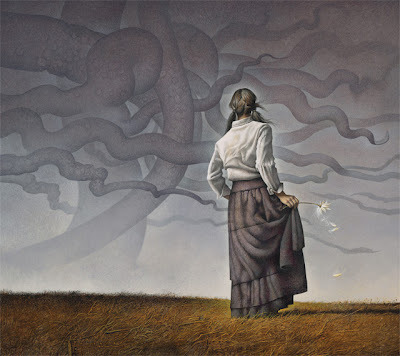
I'm in e-print again! My story "The Woman Who Shook the World-Tree" is up at Tor.com. You can read it there for free.
This is the fourth of five stories in David G. Hartwell's "Palencar Project." David sent copies of John Jude Palencar's evocative painting above to a number of science fiction writers and challenged us to write stories for it.
It is not ego that makes me feel that my story is the best but, rather, a perfectly natural tendency to write the sort of fiction that one likes most. I'm sure the other writers feel the same way about their own stories. Nevertheless, there's a lot of fun to be had, reading all the stories and deciding which you prefer and under which conditions.
For me, the chief appeal of this story is Mariella Coudy, its protatonist. She was an admirable character and one whom I enjoyed spending time with.
You can read the story here.
And you can find Palencar's website here.
*

I'm in e-print again! My story "The Woman Who Shook the World-Tree" is up at Tor.com. You can read it there for free.
This is the fourth of five stories in David G. Hartwell's "Palencar Project." David sent copies of John Jude Palencar's evocative painting above to a number of science fiction writers and challenged us to write stories for it.
It is not ego that makes me feel that my story is the best but, rather, a perfectly natural tendency to write the sort of fiction that one likes most. I'm sure the other writers feel the same way about their own stories. Nevertheless, there's a lot of fun to be had, reading all the stories and deciding which you prefer and under which conditions.
For me, the chief appeal of this story is Mariella Coudy, its protatonist. She was an admirable character and one whom I enjoyed spending time with.
You can read the story here.
And you can find Palencar's website here.
*
Published on March 22, 2012 06:35
March 21, 2012
You Live, You Learn
.Every day, I learn something new about writing. On the 300-plus mile trip home today, Marianne and I were listening to books on disc, one of which was the collection of time travel stories I mentioned the other day. So I got to listen to my own story read aloud by somebody else. Which is something I've never done before.
Something every writer learns early on is that reading your story aloud is a great way to review it just before final draft. The mistakes pop out at you.
But hearing your story read aloud by someone else is an entirely different game. It left me wishing I could rewrite the story from top to bottom to make it more subtle. There were no mistakes in it -- I'm a good enough writer yo avoid that. But hearing it in someone else's voice made me want to rewrite the thing from top to bottom to correct nuances of tone.
That's today's lesson, and it's a variation on something I learned long, long ago: No matter how good a story is, it can always be better.
*
Something every writer learns early on is that reading your story aloud is a great way to review it just before final draft. The mistakes pop out at you.
But hearing your story read aloud by someone else is an entirely different game. It left me wishing I could rewrite the story from top to bottom to make it more subtle. There were no mistakes in it -- I'm a good enough writer yo avoid that. But hearing it in someone else's voice made me want to rewrite the thing from top to bottom to correct nuances of tone.
That's today's lesson, and it's a variation on something I learned long, long ago: No matter how good a story is, it can always be better.
*
Published on March 21, 2012 16:35
March 20, 2012
The Further Adventures of Misha Cyberpunk
.
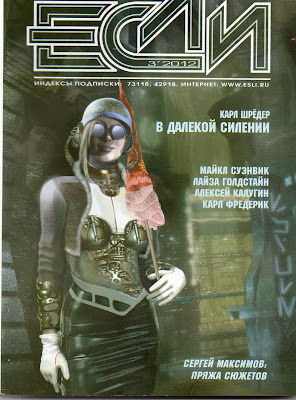
It's always a happy event to be in print again. And in Russia too!
I just received my contributor's copy of Esli (which is Russian for "If"), which contains a translation of "For I Have Lain Me Down on the Stone of Loneliness and I'll Not Be Back Again."
So how did they translate that? As камень одиночества. Which is to say, "The Stone of Loneliness."
You'll note that my name in Russian could at a glance be mistaken (by someone who isn't familiar with the Russian alphabet) for Misha Cyberpunk. A name which sounds extremely cool when you realize that in Russia cyberpunk is pronounced as if it begins with a K. I first noticed this back in the 1980s and for a while I toyed with writing a story about Misha. I remember plotting it out: He was an emigre in New Jersey and a hacker -- a good one, too. Misha Cyberpunk was his handle, rather than his real name. I seem to recall that he was supposed to be a sleeper agent but that he'd gone native. And that's all I remember except for the title: "Red Star."
I probably would've written the story, but it required a lot of research into computer hacking and there were a lot of people who knew much, much more than me writing hacker sf. So I put it off, and now I can't even remember the plot.
Vaya con Dios, Misha. Wherever you are today, I hope you're happy.
And also in yesterday's mail . . .
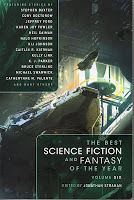 But wait! There's more! I also received a copy of
The Best Science Fiction and Fantasy of the Year Volume Six
edited by Jonathan Strahan. Which includes my short story "The Dala Horse" along with some twenty-nine others..
But wait! There's more! I also received a copy of
The Best Science Fiction and Fantasy of the Year Volume Six
edited by Jonathan Strahan. Which includes my short story "The Dala Horse" along with some twenty-nine others..
I've only started reading the volume but so far every story I've read in it -- which is to say the first one, "The Case of Death and Honey" by Neil Gaiman -- is excellent.
As stories in a best-of-the-year volume ought to be.
And as always . . .
I'm on the road again. But to help shorten the way, I have a brand new set of audio disks, Timeless Time Travel Stories edited by Allan Kaster. It is against the code to brag about my own story, "Scherzo With Tyrannosaur." So I will merely mention that it won the Hugo Award when it first came out.
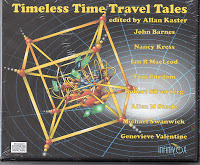 There are seven other time travel stories by writers whom every literate SF reader knows. But I will admit that I'm particularly looking forward to Tom Purdom's "The Mists of Time," in which (as it says on the package) "historieans from the future are set on a high seas adventure to document a 19th century British Admiralty anti-slavery patrol." Which inexplicably, since I'm a big fan of Tom's work, I managed to miss when it first appeared in print. I must have been distracted that month.
There are seven other time travel stories by writers whom every literate SF reader knows. But I will admit that I'm particularly looking forward to Tom Purdom's "The Mists of Time," in which (as it says on the package) "historieans from the future are set on a high seas adventure to document a 19th century British Admiralty anti-slavery patrol." Which inexplicably, since I'm a big fan of Tom's work, I managed to miss when it first appeared in print. I must have been distracted that month.
*

It's always a happy event to be in print again. And in Russia too!
I just received my contributor's copy of Esli (which is Russian for "If"), which contains a translation of "For I Have Lain Me Down on the Stone of Loneliness and I'll Not Be Back Again."
So how did they translate that? As камень одиночества. Which is to say, "The Stone of Loneliness."
You'll note that my name in Russian could at a glance be mistaken (by someone who isn't familiar with the Russian alphabet) for Misha Cyberpunk. A name which sounds extremely cool when you realize that in Russia cyberpunk is pronounced as if it begins with a K. I first noticed this back in the 1980s and for a while I toyed with writing a story about Misha. I remember plotting it out: He was an emigre in New Jersey and a hacker -- a good one, too. Misha Cyberpunk was his handle, rather than his real name. I seem to recall that he was supposed to be a sleeper agent but that he'd gone native. And that's all I remember except for the title: "Red Star."
I probably would've written the story, but it required a lot of research into computer hacking and there were a lot of people who knew much, much more than me writing hacker sf. So I put it off, and now I can't even remember the plot.
Vaya con Dios, Misha. Wherever you are today, I hope you're happy.
And also in yesterday's mail . . .
 But wait! There's more! I also received a copy of
The Best Science Fiction and Fantasy of the Year Volume Six
edited by Jonathan Strahan. Which includes my short story "The Dala Horse" along with some twenty-nine others..
But wait! There's more! I also received a copy of
The Best Science Fiction and Fantasy of the Year Volume Six
edited by Jonathan Strahan. Which includes my short story "The Dala Horse" along with some twenty-nine others..I've only started reading the volume but so far every story I've read in it -- which is to say the first one, "The Case of Death and Honey" by Neil Gaiman -- is excellent.
As stories in a best-of-the-year volume ought to be.
And as always . . .
I'm on the road again. But to help shorten the way, I have a brand new set of audio disks, Timeless Time Travel Stories edited by Allan Kaster. It is against the code to brag about my own story, "Scherzo With Tyrannosaur." So I will merely mention that it won the Hugo Award when it first came out.
 There are seven other time travel stories by writers whom every literate SF reader knows. But I will admit that I'm particularly looking forward to Tom Purdom's "The Mists of Time," in which (as it says on the package) "historieans from the future are set on a high seas adventure to document a 19th century British Admiralty anti-slavery patrol." Which inexplicably, since I'm a big fan of Tom's work, I managed to miss when it first appeared in print. I must have been distracted that month.
There are seven other time travel stories by writers whom every literate SF reader knows. But I will admit that I'm particularly looking forward to Tom Purdom's "The Mists of Time," in which (as it says on the package) "historieans from the future are set on a high seas adventure to document a 19th century British Admiralty anti-slavery patrol." Which inexplicably, since I'm a big fan of Tom's work, I managed to miss when it first appeared in print. I must have been distracted that month.*
Published on March 20, 2012 00:21
March 19, 2012
The Wolfe Fete
.
To do this past weekend justice would require that I put in several days writing an essay. Suffice it to say that when people imagine writers leading glamorous lives, what they conjure up is a pale shadow of what An Evening in Honor of Gene Wolfe was like.
As witness the above video which Bill Shunn posted on YouTube, showing Gene Wolfe, Neil Gaiman, Peter Sagal, Jill Thompson, Patrick O'Leary, David Hartwell, and yours truly, among others, riding the fabulous vintage carousel. This was after the private tour, the ceremony, the speeches, Neil's reading of "A Solar Labyrinth," the staged reading of another of Gene's stories by Terra Mysterium (very well done), an organ concert, the presentation of the Fuller Award, dinner, and many, many toasts.
After which, we got to ride the carousel.
I also got to spend time with Michael Dirda, Gary Wolfe, Peter Straub, and many other people whom I like very much. It was as pleasant a crowd as I have been in. Its composition was, I think, as sincere an honor as any Gene has ever received.
And because my photography has never been brilliant . . .
Most of my pix came out dreadful. But I'll share three of them with you. Not for the craft, mind you, but for the subjects.
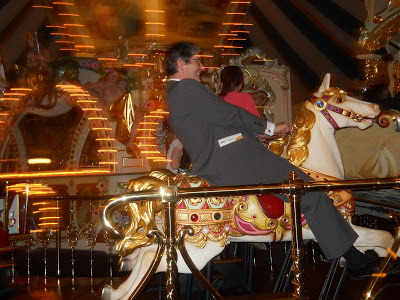
Above: Critic and International Man of Mystery Michael Dirda on a white horse.
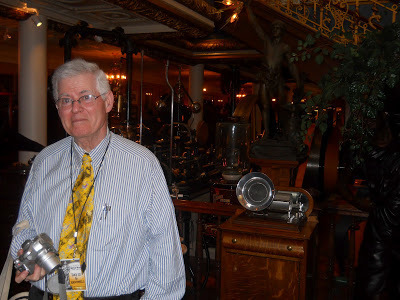
Above: David G. Hartwell in the basement of the Sanfilippo Estate, with a sea of gramophones and steam engines behind him. Just being there made you more steampunk that 99% of all steampunks combined.
And the third snap deserves a category heading all its own because . . .
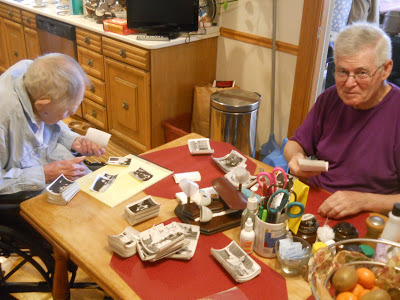
Saturday morning, I went to the house of Fred Pohl and Betty Hull to help Fred and David G. Hartwell go through a box of J.K. Klein's photographs of science fiction writers from conventions long past. Shown above is the very kitchen table where Fred and David and I pored through a couple thousand photos.
One of my favorites was James Blish in a costume of Arab robes and appropriate facial hair. He entered the costume event as "L. Sprague de Blish."
Above: I hope you noticed the casual way I dropped the word "Fred." Frederik Pohl and I are on a first-name basis. Did I mention that? No? Well, that's just how cool I am.
*
To do this past weekend justice would require that I put in several days writing an essay. Suffice it to say that when people imagine writers leading glamorous lives, what they conjure up is a pale shadow of what An Evening in Honor of Gene Wolfe was like.
As witness the above video which Bill Shunn posted on YouTube, showing Gene Wolfe, Neil Gaiman, Peter Sagal, Jill Thompson, Patrick O'Leary, David Hartwell, and yours truly, among others, riding the fabulous vintage carousel. This was after the private tour, the ceremony, the speeches, Neil's reading of "A Solar Labyrinth," the staged reading of another of Gene's stories by Terra Mysterium (very well done), an organ concert, the presentation of the Fuller Award, dinner, and many, many toasts.
After which, we got to ride the carousel.
I also got to spend time with Michael Dirda, Gary Wolfe, Peter Straub, and many other people whom I like very much. It was as pleasant a crowd as I have been in. Its composition was, I think, as sincere an honor as any Gene has ever received.
And because my photography has never been brilliant . . .
Most of my pix came out dreadful. But I'll share three of them with you. Not for the craft, mind you, but for the subjects.

Above: Critic and International Man of Mystery Michael Dirda on a white horse.

Above: David G. Hartwell in the basement of the Sanfilippo Estate, with a sea of gramophones and steam engines behind him. Just being there made you more steampunk that 99% of all steampunks combined.
And the third snap deserves a category heading all its own because . . .

Saturday morning, I went to the house of Fred Pohl and Betty Hull to help Fred and David G. Hartwell go through a box of J.K. Klein's photographs of science fiction writers from conventions long past. Shown above is the very kitchen table where Fred and David and I pored through a couple thousand photos.
One of my favorites was James Blish in a costume of Arab robes and appropriate facial hair. He entered the costume event as "L. Sprague de Blish."
Above: I hope you noticed the casual way I dropped the word "Fred." Frederik Pohl and I are on a first-name basis. Did I mention that? No? Well, that's just how cool I am.
*
Published on March 19, 2012 10:21
March 17, 2012
A Comet in the Sun
.
This has nothing to do with me, other than the fact that I think it's nifty, so I'm posting it on Saturday. NASA footage of a comet hitting the sun.
Enjoy.
*
This has nothing to do with me, other than the fact that I think it's nifty, so I'm posting it on Saturday. NASA footage of a comet hitting the sun.
Enjoy.
*
Published on March 17, 2012 00:14
March 16, 2012
Honoring Gene Wolfe
.
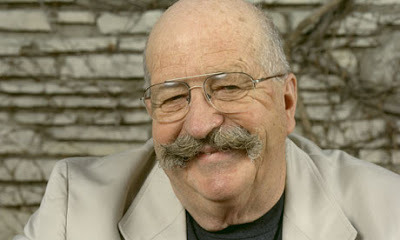
I'm on the road again. This time I'm on my way to Chicago for An Evening To Honor Gene Wolfe at the Sanfilippo Estate in Barrington Hills this Saturday. The Chicago Literary Hall of Fame is honoring Gene with the first "Fuller Award," acknowledging his outstanding lifetime contribution to literature.
There will be a whole host of celebrities, and my part in the festivities will take up only a minute or two. So I'm spending an entire weekend and umpety-ump dollars in travel expenses on an event that will benefit my career very little. And why?
Because Gene Wolfe deserves it. He has done more to make written fiction a better place to invest your time than anybody else alive today.
This is also why Gary K. Wolfe, Neil Gaiman, Terra Mysterium, Jennifer Stevenson, Peter Sagal, Michael Dirda, Peter Straub, Jody Lynn Nye, Patrick O'Leary, David G. Hartwell, Audrey Niffenegger, Bill Fawcett, Kyle Cassidy, and Sam Weller (among others) will be there as well.
You can read about the event here. I'll write a few words about the experience when it's over.
*

I'm on the road again. This time I'm on my way to Chicago for An Evening To Honor Gene Wolfe at the Sanfilippo Estate in Barrington Hills this Saturday. The Chicago Literary Hall of Fame is honoring Gene with the first "Fuller Award," acknowledging his outstanding lifetime contribution to literature.
There will be a whole host of celebrities, and my part in the festivities will take up only a minute or two. So I'm spending an entire weekend and umpety-ump dollars in travel expenses on an event that will benefit my career very little. And why?
Because Gene Wolfe deserves it. He has done more to make written fiction a better place to invest your time than anybody else alive today.
This is also why Gary K. Wolfe, Neil Gaiman, Terra Mysterium, Jennifer Stevenson, Peter Sagal, Michael Dirda, Peter Straub, Jody Lynn Nye, Patrick O'Leary, David G. Hartwell, Audrey Niffenegger, Bill Fawcett, Kyle Cassidy, and Sam Weller (among others) will be there as well.
You can read about the event here. I'll write a few words about the experience when it's over.
*
Published on March 16, 2012 00:15
March 15, 2012
Remembering Octavia Butler Again
.
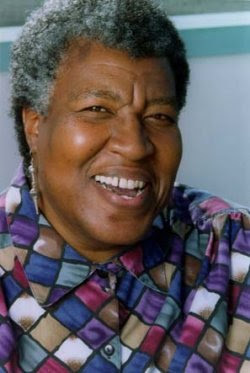
The Science Fiction and Fantasy Writers of America has just announced that this year's Aurora Awards, given to people "who have consistently had a positive, transformative influence on the genre of science fiction and fantasy," are going to John Clute and Octavia Butler. I'm happy for John, who richly deserves the honor. But my feelings are bittersweet when it comes to Octavia, because she's receiving the award posthumously.
You can read the announcement here.
And here's what I wrote back when . . .
The SFWA announcement quotes a short memorial I wrote for the Philadelphia Inquirer when Octavia died. So I thought I'd post it here for those who didn't read it back when.
Farewell to a Beloved Science-Fiction Writer
Octavia Butler died suddenly last Friday at the all-too-young age of 58. The news comes as a blow to the heart.
Octavia was the first black woman to become internationally famous as a science-fiction writer. In 1995, she was the first science-fiction writer ever to receive a MacArthur Foundation "genius grant." She won two Hugo and two Nebula awards, the highest honors science fiction has to offer. But none of this is enough to explain why she was so beloved.
Part of the reason was her life story. Octavia's father was a shoeshine man who died when she was a child. Her mother, also named Octavia, was a maid. Determined to get her daughter the education she herself was denied, she asked all her employers for any reading material they no longer wanted. Octavia once told me she grew up with what she called "the world's largest collection of coverless and scribbled-in books." She went on to get a degree and become a distinguished writer. When she won the MacArthur, she used the money to buy a house for herself, her mother, and two aunts, so that they need never fear being homeless.
Mostly Octavia was loved for her writing. Her fiction tackled tough subjects like racism, poverty, gender, and religious extremism head-on. In her novel Kindred , a contemporary African American woman travels back in time to save the life of a white, slave-owning ancestor. In Parable of the Sower , Lauren Olamina, a girl who has grown up in a gated community, loses her family and is thrown into a near-future America that has fallen into anarchy and violence. Her response is to create a new religious philosophy based on the ideas that "God is Change" and that humanity's future lies in the stars. In Parable of the Talents , Lauren's utopian community is destroyed by religious zealots and her own beliefs alienate the daughter she loves.
Octavia never settled for easy answers. Before her health failed, she took long walks every day in whatever city she was in. In her notebook, she jotted down all the problems she saw – the things that didn't work, the places where people rubbed up against each other wrong. She was looking for solutions that would work in the real world.
Because we lived on opposite coasts, Octavia and I were only occasional friends. Last year I saw her twice. Once in Seattle, where she was excited about a story one of her students had written because it posed difficult moral questions. And, most recently, at an appearance at Robin's Bookstore here in Philadelphia. Octavia once said that she had three readerships which, taken all together, were just large enough to keep her afloat – feminists, people of color, and science fiction fans. All three groups turned out to hear her at Robin's. They filled every available chair. They choked the aisles. They let her know how much she was loved.
When Octavia won the MacArthur she told the Seattle Post-Intelligencer , "People may call these 'genius grants,' but nobody made me take an IQ test before I got mine. I know I'm no genius." That's true. She was something better. She was a woman who looked for the most difficult and important task she could possibly do, and then did it. One result of having such high aspirations was frequent writer's block. Her last book, Fledgling , a vampire novel, was written as a kind of end run around her difficulty figuring out how to write the concluding volume of her "Earthseed" trilogy, The Parable of the Trickster . But nobody who knew her doubted that eventually she would finish the series. Octavia was determined. Octavia was unstoppable.
Yet now she's gone. I'll miss that deep, beautiful woodwind-like voice of hers. I'll miss her tall, imposing presence. I'll miss her sense of humor, her kindness, her courage, her strength.
Most of all, I'll miss the books she never got the time to write.
*

The Science Fiction and Fantasy Writers of America has just announced that this year's Aurora Awards, given to people "who have consistently had a positive, transformative influence on the genre of science fiction and fantasy," are going to John Clute and Octavia Butler. I'm happy for John, who richly deserves the honor. But my feelings are bittersweet when it comes to Octavia, because she's receiving the award posthumously.
You can read the announcement here.
And here's what I wrote back when . . .
The SFWA announcement quotes a short memorial I wrote for the Philadelphia Inquirer when Octavia died. So I thought I'd post it here for those who didn't read it back when.
Farewell to a Beloved Science-Fiction Writer
Octavia Butler died suddenly last Friday at the all-too-young age of 58. The news comes as a blow to the heart.
Octavia was the first black woman to become internationally famous as a science-fiction writer. In 1995, she was the first science-fiction writer ever to receive a MacArthur Foundation "genius grant." She won two Hugo and two Nebula awards, the highest honors science fiction has to offer. But none of this is enough to explain why she was so beloved.
Part of the reason was her life story. Octavia's father was a shoeshine man who died when she was a child. Her mother, also named Octavia, was a maid. Determined to get her daughter the education she herself was denied, she asked all her employers for any reading material they no longer wanted. Octavia once told me she grew up with what she called "the world's largest collection of coverless and scribbled-in books." She went on to get a degree and become a distinguished writer. When she won the MacArthur, she used the money to buy a house for herself, her mother, and two aunts, so that they need never fear being homeless.
Mostly Octavia was loved for her writing. Her fiction tackled tough subjects like racism, poverty, gender, and religious extremism head-on. In her novel Kindred , a contemporary African American woman travels back in time to save the life of a white, slave-owning ancestor. In Parable of the Sower , Lauren Olamina, a girl who has grown up in a gated community, loses her family and is thrown into a near-future America that has fallen into anarchy and violence. Her response is to create a new religious philosophy based on the ideas that "God is Change" and that humanity's future lies in the stars. In Parable of the Talents , Lauren's utopian community is destroyed by religious zealots and her own beliefs alienate the daughter she loves.
Octavia never settled for easy answers. Before her health failed, she took long walks every day in whatever city she was in. In her notebook, she jotted down all the problems she saw – the things that didn't work, the places where people rubbed up against each other wrong. She was looking for solutions that would work in the real world.
Because we lived on opposite coasts, Octavia and I were only occasional friends. Last year I saw her twice. Once in Seattle, where she was excited about a story one of her students had written because it posed difficult moral questions. And, most recently, at an appearance at Robin's Bookstore here in Philadelphia. Octavia once said that she had three readerships which, taken all together, were just large enough to keep her afloat – feminists, people of color, and science fiction fans. All three groups turned out to hear her at Robin's. They filled every available chair. They choked the aisles. They let her know how much she was loved.
When Octavia won the MacArthur she told the Seattle Post-Intelligencer , "People may call these 'genius grants,' but nobody made me take an IQ test before I got mine. I know I'm no genius." That's true. She was something better. She was a woman who looked for the most difficult and important task she could possibly do, and then did it. One result of having such high aspirations was frequent writer's block. Her last book, Fledgling , a vampire novel, was written as a kind of end run around her difficulty figuring out how to write the concluding volume of her "Earthseed" trilogy, The Parable of the Trickster . But nobody who knew her doubted that eventually she would finish the series. Octavia was determined. Octavia was unstoppable.
Yet now she's gone. I'll miss that deep, beautiful woodwind-like voice of hers. I'll miss her tall, imposing presence. I'll miss her sense of humor, her kindness, her courage, her strength.
Most of all, I'll miss the books she never got the time to write.
*
Published on March 15, 2012 09:01
Michael Swanwick's Blog
- Michael Swanwick's profile
- 546 followers
Michael Swanwick isn't a Goodreads Author
(yet),
but they
do have a blog,
so here are some recent posts imported from
their feed.



